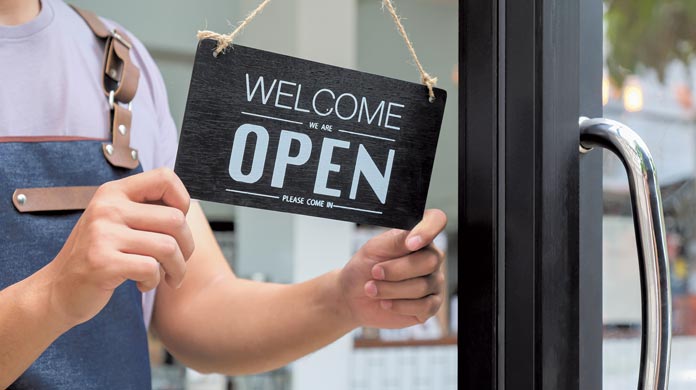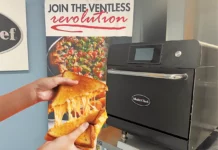
Article contributed by Valerie Bluth, Ellenoff Grossman & Schole LLP
Last month, I discussed the state of the restaurant industry and how to navigate the road back to “normal.” While we’re still not there, I’m happy to report there is light end of the tunnel, albeit faint. Restaurants in numerous states have been permitted to reopen for on-premises dining, whether outdoor only or indoor, with numerous anticipated restrictions. Restrictions presently in place include reduced customer capacity, prohibition on bar seating, requirements for employees – and in some cases patrons – to wear masks, and mandatory implementation of strict sanitation standards.
Given the expected on-premises dining landscape, there are a host of employee-related considerations to which employers should pay close attention. Putting aside the practical implications of these restrictions, restaurant employers should be focused on ensuring the health and safety of employees and customers, as well as compliance with applicable wage and hour laws.
First, employers would be prudent to institute new and expanded health and safety policies pertaining to employees. For example, even if not required by federal, state or local regulations, employers should consider requiring employees to wear masks when interacting with others, and to ensure that employees engaged in food preparation are wearing – and regularly changing – gloves.
Further, while there not be an actual requirement that employees be screened for COVID-19 symptoms, or contact with those who have symptoms of or have been exposed to COVID-19, the EEOC has said that employers may conduct health screening, including body temperature checks, on its employees without running afoul of discrimination laws.
Employers are encouraged to do so, but must conduct health screenings and temperature checks uniformly. That is, all employees should be screened before every shift, as opposed to singling out any particular employee or subset of employees. Further, employers that maintain records of these health screenings must keep employee medical and health information confidential.
These health screenings should include verbal questions regarding the presence of COVID-19 symptoms as set out by the CDC and, if the employee does not have any symptoms, a body temperature check. Employees who are experiencing COVID-19 symptoms or have a fever (which the CDC defines as 100.4 degrees or greater) should be sent home. Perhaps more importantly, employees should be advised to stay home if they are sick, or might be sick. In that regard, employers are encouraged to have flexible time off policies for COVID-19 absences, and most restaurant employees are likely entitled to emergency paid sick leave provided for under the federal Families First Coronavirus Response Act. They may also be state and or local paid leave available to employees who cannot work once the restaurant has reopened because they are experiencing COVID-19 symptoms, have been diagnosed with COVID-19, or caring for a family member who is ill, or may be ill, with COVID-19.
For employers with open restaurants, it is now more than ever important to stay vigilant about compensation issues. First, if an employer is requiring an employee to wear a mask and/or gloves, the employer either needs to provide that personal protective equipment, or otherwise reimburse employees for providing their own.
As to whether the time undergoing health screenings is compensable, the issue is most closely analogous to compensability of required security or bag checks. Federal courts have held that time spent undergoing these types of checks is not compensable under the Fair Labor Standards Act, but depending on where the employer operates, there may be a state-specific requirement to compensate the employee for that time. For example, time spent undergoing health screenings would likely not be compensable in New York or Florida, but would likely be compensable in Nevada and Washington D.C.
There is also the issue of compensating an employee if they show up to work and are sent home because the restaurant is not busy. This is a state-by-state issue, but numerous states require an employee to be paid for a certain amount of time just for showing up. For example, in New York, employees who report to work but are sent home early must be paid for at least three hours or the length of the scheduled shift if shorter, employees in Washington D.C. must be paid for at least four hours each day they report to work unless the employee is regularly scheduled to work for less than four hours a day, and in New Jersey must be paid for at least one hour on a day they report to work. By contrast, there is no such minimum pay requirement in Florida and Nevada.
The new on-premises dining landscape may also pose challenges with respect to the compensation of tipped employees.
Last month we advised that employers who take a tip credit from the wages of tipped employees must ensure that the tipped employee is earning enough tips to make up for the tip credit, or must be compensated for the difference. Another potential pitfall for tipped employees is ensuring the tipped employee is not performing too much “side work.” In a world where constant sanitization is going to be the norm, it would be very tempting to have, for example, a server sanitize their assigned tables after a customer leaves, or to assign a busser to roll clean silverware into napkins or wipe down the restrooms. However, in places like New York where an employer can lose the tip credit if the employee performs side work for more than 2 hours or 20% of their shift, this could be problematic. Not only is it practically impossible to track the amount of time a tipped employee spends performing these types of in-between-service side work duties, but perhaps more importantly it is very difficult to defend against a claim that the employee performed too much side work. The best practice is assign a dedicated individual (or individuals), who are paid at the full minimum wage, to be primarily responsible for sanitization measures.
Unfortunately, there are innumerable, ever-changing issues and considerations employers need to be paying attention to right now. Nonetheless, one thing is for certain: plaintiff attorneys have been sitting around for months waiting for you to reopen; employers should take steps wherever they can to gain compliance with existing workplace laws as they continue to navigate their way back to “normal.”
 Valerie Bluth is a Partner in the Labor & Employment Group at Ellenoff Grossman & Schole LLP. For more than ten years, Ms. Bluth has exclusively represented and advised clients in employment-related matters, with a particular focus in the hospitality industry. Above all, Ms. Bluth works tirelessly to ensure clients are in compliance with an ever-changing landscape of federal, state and local employment laws, especially with respect to pay practices and employment policies, and to devise practical solutions for any employment problems that might arise. Ms. Bluth can be reached at (212) 370-1300 or vbluth@egsllp.com.
Valerie Bluth is a Partner in the Labor & Employment Group at Ellenoff Grossman & Schole LLP. For more than ten years, Ms. Bluth has exclusively represented and advised clients in employment-related matters, with a particular focus in the hospitality industry. Above all, Ms. Bluth works tirelessly to ensure clients are in compliance with an ever-changing landscape of federal, state and local employment laws, especially with respect to pay practices and employment policies, and to devise practical solutions for any employment problems that might arise. Ms. Bluth can be reached at (212) 370-1300 or vbluth@egsllp.com.























